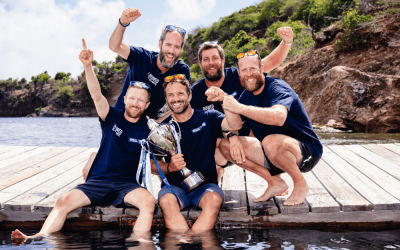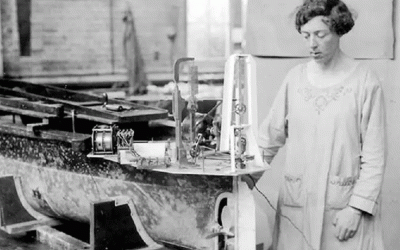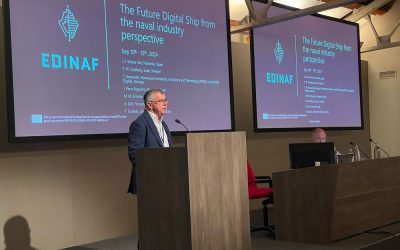The Naval Architect: January 2020
Just weeks before the 2020 sulphur cap came into effect as the latest in a long list of environmental regulations, the shipping industry was been demonstrating its environmental commitment and credential at events as far apart as Shanghai and Madrid.
As maritime exhibitions go, Marintec China is seen less as presenting the latest developments to potential shipowners as being an opportunity for equipment makers to sell goods and ideas to the Chinese shipbuilding sector. However, in recent years it has also been used to promote new ship designs and concepts and each time at the biennial event a theme evolves around hot topics within the industry.
Two years ago, it was smart and autonomous ships making the news but in 2019 the environmental impact of shipping was the major talking point. Almost certainly that is because since the IMO’s MEPC adopted its decarbonisation roadmap in April 2018, finding a means of reaching the ambitious targets set has become something akin to the quest for the Holy Grail. Until a truly carbon-free form of propulsion becomes available, shipping must either look to ways to reduce CO2 emissions rather than eliminate them altogether.
At Marintec, numerous new emission-reducing ship designs were given Approvals in Principal (AiP) by different classification societies. The majority of these were dual-fuel ships utilising LNG which, while not truly decarbonised, can be seen as being in line with IMO’s 2050 reduction targets.
Lloyd’s Register handed out at least nine AiPs including to China Merchants Energy Shipping, and Dalian Shipbuilding Industry (DSIC) for the development of the first efficient LNG-fuelled VLCC; DSIC got another for a 175,000m3 LNG carrier and COSCO Zhousan for a dual-fuel Aframax. Marine Design and Research Institute of China received a trio of AiPs for dual-fuel tankers: a 113,000dwt Aframax, a 158,000dwt Suezmax and a 300,000dwt VLCC.
Three more went to SWS, Anemoi Marine Technologies. and Silverstream Technologies for an energy efficient 180,000dwt dual-fuel Capesize bulk carrier design. A second bulk carrier AiP was given to Penglai Zhoushan Jinglu Ship Industry, China Ship Scientific Research Centre and CSIC Shanghai Marine Energy Saving Technology Development for their energy efficient 88,000dwt design. Several of the projects mentioned also received AiPs from ABS and DNV GL.
Bureau Veritas also handed out an AiP for an innovative 19,000m3 LNG bunkering vessel called the Quadelprop, which features an azimuth thruster fitted at each corner of the hull and controlled by a redundant dynamic positioning (DP) system.
Showcasing advances to other players within the industry is one thing but persuading outsiders of shipping’s progress is more difficult but that is what the ICS attempted to do at the COP 25 Climate conference in Madrid.
From an environmentalist point of view, it was generally accepted that the COP talks were far from successful with very few countries committing to reducing their carbon emissions. However, Simon Bennett, ICS Deputy Secretary General, speaking at a side event, updated the audience on what was happening within the shipping industry saying, "There are already mandatory CO2 reduction regulations in force globally that will require all new ships to be at least 30% more carbon-efficient by 2025, with a 50% improvement by large containerships by 2022. In line with the ambitious CO2 reduction targets which IMO Member States agreed last year, the IMO will adopt a new package of regulations in 2020 with a focus on operational fuel efficiency and speed optimisation. This should ensure further CO2 reductions by 2023 and that the sector is on track to exceed the IMO target of a 40% efficiency improvement across the entire world fleet by 2030”.
“The industry’s greatest priority is to help the IMO make rapid progress with implementing its very ambitious 2050 target, cutting the sector’s total CO2 emissions, regardless of trade growth, by at least 50%, with full decarbonisation soon after”.
Following the ICS’s presentation, Martin Dorsman, Secretary-General of the European Community Shipowners’ Association, commented on the European front. Following the announcement of the European Green Deal two days previously he said the industry fully supports the new European Commission’s ambitions to be the first climate-neutral continent but called for action on a global basis.
He added: “We urgently need new technologies and alternative fuels. The EU can support R&D by making EU funds suitable for use by the shipping industry and the broader maritime cluster. Europe must support pilot projects and the deployment of bunkering infrastructure in EU ports for new fuels."
Whether or not the comments at the ICS event get reported, it is evident that shipping is taking its role more seriously than many nation states.
Malcolm Latarche.




